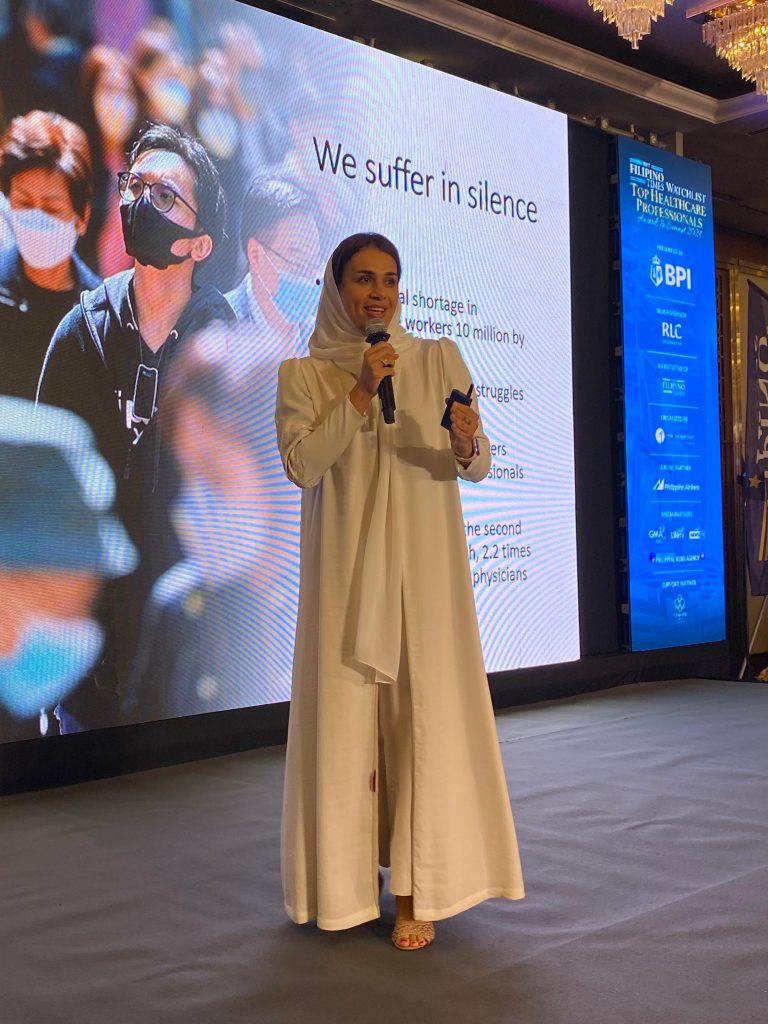With a shortage of mental health professionals and limited access to care, many are turning to artificial intelligence (AI) as a potential solution. But can AI truly address the complexities of mental health?
At the TFT Watchlist: Top Healthcare Professionals in the Middle East Summit 2024, the event began with an inspiring keynote from Dr. Khulood Mohamed Alsayegh, an expert in AI Ethics, who shared insights into the evolving role of AI in healthcare.
The problem: A lack of mental care
In her presentation, she emphasized the heavy burden placed on healthcare professionals: “We are expected to take care of others, not to be the ones taken care of.” She highlighted a worrying rise in mental health issues among healthcare workers, with 14 percent reportedly struggling with mental illnesses and an increased risk of suicide.

Dr. Alsayegh shed light on the mental health struggles of healthcare professionals, pointing out that the high number of mental health patients globally is largely due to the limited access to mental health professionals. Displaying a photo of a football stadium, she illustrated the severity of the shortage: “If I put one doctor in the middle of that stadium, that doctor would be responsible for the mental well-being of all the audience around. This is the scale of the shortage we are facing globally.”
Moreover, she emphasized that the mental health challenges faced by healthcare professionals go beyond the usual stereotypes of anxiety and depression, extending to a broader range of “feelings and symptoms” that are often overlooked.
“That constant tiredness, of all the night shift, that sleep disturbances when we mix times, that burnout, that feeling of loss of motivation,” she said.
Due to the shortage of mental health professionals, many are turning to AI to “solve all their problems.”
“This AI is being very creative and able to empathize with you. People are considering AI tools where they can express their feelings,” she said. But this raises a critical question: “Can it really solve the mental health problems we’re facing?”
Can AI solve the issue?
Some can doubt what AI can do because there is always the concern of AI giving an accurate answer.
Dr. Alsayegh pointed out a key limitation of AI in mental healthcare: its inability to objectively diagnose mental disorders. “I can measure if you’re diabetic by checking your blood sugar,” she explained. “But how can I measure your outcome—whether you’re doing bad or good in mental illness?”
In a recent global study authored by Dr. Alsayegh in collaboration with Mohamed Bin Rashid School of Government and Massey University in New Zealand. Dr. Alsayegh highlighted how AI has proven remarkably effective in identifying different types of mental health conditions, revealing that symptoms of depression manifest uniquely in each individual.
Using data, AI demonstrated an impressive ability to identify subtypes of depression within communities. “It can tell me that this group of people over here—when they’re depressed, their symptoms are more physical and may be described as tiredness,” she explained.
“Meanwhile, the group over there—their symptoms of depression is on how they perceive the world. They describe their feelings as worthless,” the doctor stated.
She further elaborated that AI can effectively group patients by using common symptoms and provides aggregated data that highlights risks, such as potential suicide or job resignation.
Additionally, AI could offer proactive intervention recommendations, determining whether a patient might need a counselor, psychologist, or support group for tailored care.
“As a result of that, Mohamed bin Rashid School of Governance published the policy on the ‘Future of Workplace Wellbeing: Let’s Measure Impact,’ which looks into building Mental Health Resilience, building strategies, and ensuring that there’s transparency in the data,” she said.
AI: To adopt or not to adopt?
The decision to integrate AI into the medical field is a personal choice, but Dr. Alsayegh emphasized the importance of considering four key principles when making that choice: transparency, accountability, privacy, and algorithmic bias. She stressed that any AI solution must work not just for a few but for the benefit of many.
“I want to see equity. I want to see a world where you are able to access healthcare equally, a world where you are able to have equal outcomes. I want to show that no one is held back, and if you need help, it is available, and if that invisible hero is able to do so, then maybe it’s time to adopt it,” the doctor said.

Dr. Alsayegh left the audience with a powerful reflection: “A physician with AI will surpass one without it.” As AI continues to make its way into healthcare, the future might not be far off—a future where everyone has access to an AI tool capable of supporting their personal mental well-being.
The Filipino Times Watchlist: Top Healthcare Professionals in the Middle East Summit 2024, presented by the Bank of the Philippine Islands, was supported by our Silver Sponsor, RLC Residences; our Airline Partner, Philippine Airlines; and our Support Partner, Danaya’s Flowers. Its media partners are GMA Pinoy TV and The Philippine News Agency.




